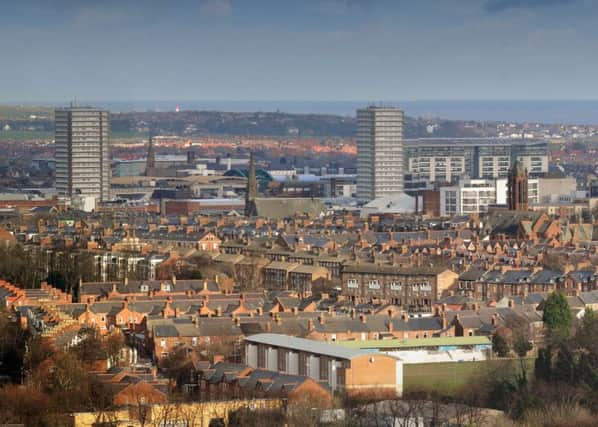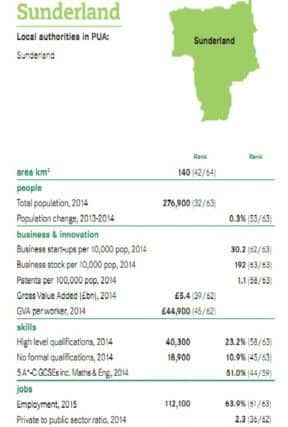Sunderland losing out in drive towards '˜higher-wage, low-welfare economy'


Cities Outlook 2016 is the organisation’s annual health-check on the economies of the UK’s 63 largest cities, and this year focuses on the Chancellor’s vision, as laid out in last summer’s budget.
It makes sorry reading for Sunderland, with the city coming in the bottom ten in a host of categories, including:


l Welfare spend per head;
l Number of businesses;
l Business start-up rate;
l Jobseeker’s Allowance claimant rates;


l Change in house prices;
l Number of patents granted;
Advertisement
Hide AdAdvertisement
Hide Adl Proportion of residents with higher education qualifications.
Wearside is not alone in struggling to meeting the Chancellor’s aim, however.
Today’s report shows nearly half of UK cities have ‘low-wage, high-welfare’ economies and just 14 are classed as ‘high-wage, low-welfare.’
And the challenge the Chancellor faces in making his ‘Northern Powerhouse’ vision a reality is starkly outlined, with today’s report showing the north/south divide is alive and kicking.
Advertisement
Hide AdAdvertisement
Hide AdEight of the top 10 ‘high-wage, low-welfare’ cities are located in the Greater South East, while nine of the bottom ten cities for wages are in the North or Midlands.
Centre for Cities chief executive Alexandra Jones said the Northern Powerhouse plans had concentrated on infrastructure, rather than details of how the Government intended to tackle the inequalities facing the UK’s cities.
“Cities Outlook 2016 highlights the size of the challenge facing the Government in building a high-wage, low-welfare economy, and the importance of supporting and empowering UK cities in order to make that vision a reality,” she said.
“One of the most pressing issues is the need to tackle skills-gaps and improve schools attainment, especially in low-wage cities, to help those places attract businesses and jobs, and support more people to move into work, particularly in high-skill sectors.
Advertisement
Hide AdAdvertisement
Hide Ad“This should be a key part of the Government’s Northern Powerhouse initiative alongside investment in infrastructure, and a top priority for local leaders.
“Giving places control over skills and welfare budgets, and allowing them to keep any savings made by reducing the welfare bill, would incentivise local leaders to invest in employment programmes that, if successful, would reduce people’s need for benefits payments.
“Further devolution would also enable local leaders to make spending decisions which better meet the needs of their communities and give them more incentives to drive economic growth.”
Civic and business leaders on Wearside accepted many of the issues raised in today’s report – but insisted the future was bright for Wearside.
Advertisement
Hide AdAdvertisement
Hide AdCity Council leader Coun Paul Watson said: “I am aware of what Centre for Cities says, and I am also aware that we are creating thousands of jobs every year in Sunderland and attracting millions of pounds of investment - public and private.
“In the last five years there’s been more £1billion invested in Sunderland.
“With our Economic Masterplan and as part of the Sunderland and South Tyneside City Deal, we are currently consulting on proposals for a new International Advanced Manufacturing Park to the north of Nissan and west of the A19.
“This is to create a further 5,000 hi-end manufacturing jobs and build on our successes.
Advertisement
Hide AdAdvertisement
Hide Ad“We have a growing reputation for software and IT work, with more than 1,000 people already employed in this sector, and are seeing further growth in this sector. We’re currently building the New Wear Crossing – which at £100million is the region’s biggest civil engineering project – and this will help create more growth and investment.
“Suggestions that this city’s prospects are bleak are misguided. I believe we’re very much on course for seeing more positive economic growth, more prosperity and more job creation in the future.
SAFC commercial director Gary Hutchinson is chairman of the North East Chamber of Commerce Sunderland committee and a founder member of the Sunderland Business Group: “There have been wholesale improvements across the city in recent years,” he said.
“Plans to grow and develop Sunderland are starting to come to fruition and the aim is to ensure continued investment to help the city reach its full potential.
Advertisement
Hide AdAdvertisement
Hide Ad“We have faced many challenges in the past, not least the decline of the industries on which our great city was built, but Sunderland and its people are resilient.
“We are entering a new era, with our aim being to re-invigorate the city economy and developments such as the new Wear Crossing and the building of new hotels will bring a much needed economic boost to the city and the population.
“Of course there is no quick fix, the plans are aimed at securing development for the long-term, but we are sowing the seeds and I am confident that Sunderland will reap the rewards in years to come.”